New Treasure Seekers; Or, The Bastable Children in Search of a Fortune Read online
Page 3
_THE CONSCIENCE-PUDDING_
IT was Christmas, nearly a year after Mother died. I cannot write aboutMother--but I will just say one thing. If she had only been away for alittle while, and not for always, we shouldn't have been so keen onhaving a Christmas. I didn't understand this then, but I am much oldernow, and I think it was just because everything was so different andhorrid we felt we _must_ do something; and perhaps we were notparticular enough _what_. Things make you much more unhappy when youloaf about than when you are doing events.
Father had to go away just about Christmas. He had heard that his wickedpartner, who ran away with his money, was in France, and he thought hecould catch him, but really he was in Spain, where catching criminals isnever practised. We did not know this till afterwards.
Before Father went away he took Dora and Oswald into his study, andsaid--
"I'm awfully sorry I've got to go away, but it is very serious business,and I must go. You'll be good while I'm away, kiddies, won't you?"
We promised faithfully. Then he said--
"There are reasons--you wouldn't understand if I tried to tell you--butyou can't have much of a Christmas this year. But I've told Matilda tomake you a good plain pudding. Perhaps next Christmas will be brighter."
(It was; for the next Christmas saw us the affluent nephews and niecesof an Indian uncle--but that is quite another story, as good old Kiplingsays.)
When Father had been seen off at Lewisham Station with his bags, and aplaid rug in a strap, we came home again, and it was horrid. There werepapers and things littered all over his room where he had packed. Wetidied the room up--it was the only thing we could do for him. It wasDicky who accidentally broke his shaving-glass, and H.O. made a paperboat out of a letter we found out afterwards Father particularly wantedto keep. This took us some time, and when we went into the nursery thefire was black out, and we could not get it alight again, even with thewhole _Daily Chronicle_. Matilda, who was our general then, was out, aswell as the fire, so we went and sat in the kitchen. There is always agood fire in kitchens. The kitchen hearthrug was not nice to sit on, sowe spread newspapers on it.
It was sitting in the kitchen, I think, that brought to our minds myFather's parting words--about the pudding, I mean.
Oswald said, "Father said we couldn't have much of a Christmas forsecret reasons, and he said he had told Matilda to make us a plainpudding."
The plain pudding instantly cast its shadow over the deepening gloom ofour young minds.
"I wonder _how_ plain she'll make it?" Dicky said.
"As plain as plain, you may depend," said Oswald. "Ahere-am-I-where-are-you pudding--that's her sort."
The others groaned, and we gathered closer round the fire till thenewspapers rustled madly.
"I believe I could make a pudding that _wasn't_ plain, if I tried,"Alice said. "Why shouldn't we?"
"No chink," said Oswald, with brief sadness.
"How much would it cost?" Noel asked, and added that Dora had twopenceand H.O. had a French halfpenny.
Dora got the cookery-book out of the dresser drawer, where it laydoubled up among clothes-pegs, dirty dusters, scallop shells, string,penny novelettes, and the dining-room corkscrew. The general we hadthen--it seemed as if she did all the cooking on the cookery-bookinstead of on the baking-board, there were traces of so many bygonemeals upon its pages.
"It doesn't say Christmas pudding at all," said Dora.
"Try plum," the resourceful Oswald instantly counselled.
Dora turned the greasy pages anxiously.
"'Plum-pudding, 518.
"'A rich, with flour, 517.
"'Christmas, 517.
"'Cold brandy sauce for, 241.'
"We shouldn't care about that, so it's no use looking.
"'Good without eggs, 518.
"'Plain, 518.'
"We don't want _that_ anyhow. 'Christmas, 517'--that's the one."
It took her a long time to find the page. Oswald got a shovel of coalsand made up the fire. It blazed up like the devouring elephant the_Daily Telegraph_ always calls it. Then Dora read--
"'Christmas plum-pudding. Time six hours.'"
"To eat it in?" said H.O.
"No, silly! to make it."
"Forge ahead, Dora," Dicky replied.
Dora went on--
"'2072. One pound and a half of raisins; half a pound of currants; threequarters of a pound of breadcrumbs; half a pound of flour;three-quarters of a pound of beef suet; nine eggs; one wine glassful ofbrandy; half a pound of citron and orange peel; half a nutmeg; and alittle ground ginger.' I wonder _how_ little ground ginger."
"A teacupful would be enough, I think," Alice said; "we must not beextravagant."
"We haven't got anything yet to be extravagant _with_," said Oswald, whohad toothache that day. "What would you do with the things if you'd gotthem?"
"You'd 'chop the suet as fine as possible'--I wonder how fine that is?"replied Dora and the book together--"'and mix it with the breadcrumbsand flour; add the currants washed and dried.'"
"Not starched, then," said Alice.
"'The citron and orange peel cut into thin slices'--I wonder what theycall thin? Matilda's thin bread-and-butter is quite different from whatI mean by it--'and the raisins stoned and divided.' How many heaps wouldyou divide them into?"
"Seven, I suppose," said Alice; "one for each person and one for thepot--I mean pudding."
"'Mix it all well together with the grated nutmeg and ginger. Then stirin nine eggs well beaten, and the brandy'--we'll leave that out, Ithink--'and again mix it thoroughly together that every ingredient maybe moistened; put it into a buttered mould, tie over tightly, and boilfor six hours. Serve it ornamented with holly and brandy poured overit.'"
"I should think holly and brandy poured over it would be simplybeastly," said Dicky.
"I expect the book knows. I daresay holly and water would do as wellthough. 'This pudding may be made a month before'--it's no use readingabout that though, because we've only got four days to Christmas."
"It's no use reading about any of it," said Oswald, with thoughtfulrepeatedness, "because we haven't got the things, and we haven't got thecoin to get them."
"We might get the tin somehow," said Dicky.
"There must be lots of kind people who would subscribe to a Christmaspudding for poor children who hadn't any," Noel said.
"Well, I'm going skating at Penn's," said Oswald. "It's no use thinkingabout puddings. We must put up with it plain."
So he went, and Dicky went with him.
When they returned to their home in the evening the fire had beenlighted again in the nursery, and the others were just having tea. Wetoasted our bread-and-butter on the bare side, and it gets a little warmamong the butter. This is called French toast. "I like English better,but it is more expensive," Alice said--
"Matilda is in a frightful rage about your putting those coals on thekitchen fire, Oswald. She says we shan't have enough to last overChristmas as it is. And Father gave her a talking to before he wentabout them--asked her if she ate them, she says--but I don't believe hedid. Anyway, she's locked the coal-cellar door, and she's got the key inher pocket. I don't see how we can boil the pudding."
"What pudding?" said Oswald dreamily. He was thinking of a chap he hadseen at Penn's who had cut the date 1899 on the ice with four strokes.
"_The_ pudding," Alice said. "Oh, we've had such a time, Oswald! FirstDora and I went to the shops to find out exactly what the pudding wouldcost--it's only two and elevenpence halfpenny, counting in the holly."
"It's no good," Oswald repeated; he is very patient and will say thesame thing any number of times. "It's no good. You know we've got notin."
"Ah," said Alice, "but Noel and I went out, and we called at some of thehouses in Granville Park and Dartmouth Hill--and we got a lot ofsixpences and shillings, besides pennies, and one old gentleman gave ushalf-a-crown. He was so nice. Quite bald, with a knitted red and bluewaistcoat. We've got eight-and-sev
enpence."
Oswald did not feel quite sure Father would like us to go asking forshillings and sixpences, or even half-crowns from strangers, but he didnot say so. The money had been asked for and got, and it couldn't behelped--and perhaps he wanted the pudding--I am not able to rememberexactly why he did not speak up and say, "This is wrong," but anyway hedidn't.
Alice and Dora went out and bought the things next morning. They boughtdouble quantities, so that it came to five shillings and elevenpence,and was enough to make a noble pudding. There was a lot of holly leftover for decorations. We used very little for the sauce. The money thatwas left we spent very anxiously in other things to eat, such as datesand figs and toffee.
We did not tell Matilda about it. She was a red-haired girl, and apt toturn shirty at the least thing.
Concealed under our jackets and overcoats we carried the parcels up tothe nursery, and hid them in the treasure-chest we had there. It was thebureau drawer. It was locked up afterwards because the treacle got allover the green baize and the little drawers inside it while we werewaiting to begin to make the pudding. It was the grocer told us we oughtto put treacle in the pudding, and also about not so much ginger as ateacupful.
When Matilda had begun to pretend to scrub the floor (she pretended thisthree times a week so as to have an excuse not to let us in the kitchen,but I know she used to read novelettes most of the time, because Aliceand I had a squint through the window more than once), we barricaded thenursery door and set to work. We were very careful to be quite clean. Wewashed our hands as well as the currants. I have sometimes thought wedid not get all the soap off the currants. The pudding smelt like awashing-day when the time came to cut it open. And we washed a corner ofthe table to chop the suet on. Chopping suet looks easy till you try.
Father's machine he weighs letters with did to weigh out the things. Wedid this very carefully, in case the grocer had not done so. Everythingwas right except the raisins. H.O. had carried them home. He was veryyoung then, and there was a hole in the corner of the paper bag and hismouth was sticky.
Lots of people have been hanged to a gibbet in chains on evidence noworse than that, and we told H.O. so till he cried. This was good forhim. It was not unkindness to H.O., but part of our duty.
Chopping suet as fine as possible is much harder than any one wouldthink, as I said before. So is crumbling bread--especially if your loafis new, like ours was. When we had done them the breadcrumbs and thesuet were both very large and lumpy, and of a dingy gray colour,something like pale slate pencil.
They looked a better colour when we had mixed them with the flour. Thegirls had washed the currants with Brown Windsor soap and the sponge.Some of the currants got inside the sponge and kept coming out in thebath for days afterwards. I see now that this was not quite nice. We cutthe candied peel as thin as we wish people would cut ourbread-and-butter. We tried to take the stones out of the raisins, butthey were too sticky, so we just divided them up in seven lots. Then wemixed the other things in the wash-hand basin from the spare bedroomthat was always spare. We each put in our own lot of raisins and turnedit all into a pudding-basin, and tied it up in one of Alice's pinafores,which was the nearest thing to a proper pudding-cloth we could find--atany rate clean. What was left sticking to the wash-hand basin did nottaste so bad.
"It's a little bit soapy," Alice said, "but perhaps that will boil out;like stains in table-cloths."
It was a difficult question how to boil the pudding. Matilda provedfurious when asked to let us, just because some one had happened toknock her hat off the scullery door and Pincher had got it and done forit. However, part of the embassy nicked a saucepan while the others werebeing told what Matilda thought about the hat, and we got hot water outof the bath-room and made it boil over our nursery fire. We put thepudding in--it was now getting on towards the hour of tea--and let itboil. With some exceptions--owing to the fire going down, and Matildanot hurrying up with coals--it boiled for an hour and a quarter. ThenMatilda came suddenly in and said, "I'm not going to have you messingabout in here with my saucepans"; and she tried to take it off the fire.You will see that we couldn't stand this; it was not likely. I do notremember who it was that told her to mind her own business, and I thinkI have forgotten who caught hold of her first to make her chuck it. I amsure no needless violence was used. Anyway, while the struggleprogressed, Alice and Dora took the saucepan away and put it in theboot-cupboard under the stairs and put the key in their pocket.
This sharp encounter made every one very hot and cross. We got over itbefore Matilda did, but we brought her round before bedtime. Quarrelsshould always be made up before bedtime. It says so in the Bible. Ifthis simple rule was followed there would not be so many wars andmartyrs and law suits and inquisitions and bloody deaths at the stake.
All the house was still. The gas was out all over the house except onthe first landing, when several darkly-shrouded figures might have beenobserved creeping downstairs to the kitchen.
On the way, with superior precaution, we got out our saucepan. Thekitchen fire was red, but low; the coal-cellar was locked, and there wasnothing in the scuttle but a little coal-dust and the piece of brownpaper that is put in to keep the coals from tumbling out through thebottom where the hole is. We put the saucepan on the fire and plied itwith fuel--two _Chronicles_, a _Telegraph_, and two _Family Herald_novelettes were burned in vain. I am almost sure the pudding did notboil at all that night.
"Never mind," Alice said. "We can each nick a piece of coal every timewe go into the kitchen to-morrow."
This daring scheme was faithfully performed, and by night we had nearlyhalf a waste-paper basket of coal, coke, and cinders. And in the depthof night once more we might have been observed, this time with ourcollier-like waste-paper basket in our guarded hands.
There was more fire left in the grate that night, and we fed it with thefuel we had collected. This time the fire blazed up, and the puddingboiled like mad. This was the time it boiled two hours--at least I thinkit was about that, but we dropped asleep on the kitchen tables anddresser. You dare not be lowly in the night in the kitchen, because ofthe beetles. We were aroused by a horrible smell. It was thepudding-cloth burning. All the water had secretly boiled itself away. Wefilled it up at once with cold, and the saucepan cracked. So we cleanedit and put it back on the shelf and took another and went to bed. Yousee what a lot of trouble we had over the pudding. Every evening tillChristmas, which had now become only the day after to-morrow, we sneakeddown in the inky midnight and boiled that pudding for as long as itwould.
On Christmas morning we chopped the holly for the sauce, but we put hotwater (instead of brandy) and moist sugar. Some of them said it was notso bad. Oswald was not one of these.
Then came the moment when the plain pudding Father had ordered smokedupon the board. Matilda brought it in and went away at once. She had acousin out of Woolwich Arsenal to see her that day, I remember. Thosefar-off days are quite distinct in memory's recollection still.
Then we got out our own pudding from its hiding-place and gave it onelast hurried boil--only seven minutes, because of the general impatiencewhich Oswald and Dora could not cope with.
We had found means to secrete a dish, and we now tried to dish thepudding up, but it stuck to the basin, and had to be dislodged with thechisel. The pudding was horribly pale. We poured the holly sauce overit, and Dora took up the knife and was just cutting it when a few simplewords from H.O. turned us from happy and triumphing cookery artists topersons in despair.
He said: "How pleased all those kind ladies and gentlemen would be ifthey knew _we_ were the poor children they gave the shillings andsixpences and things for!"
We all said, "_What?_" It was no moment for politeness.
"I say," H.O. said, "they'd be glad if they knew it was us was enjoyingthe pudding, and not dirty little, really poor children."
"You should say 'you were,' not 'you was,'" said Dora, but it was as ina dream and only from habit.
"Do you mea
n to say"--Oswald spoke firmly, yet not angrily--"that youand Alice went and begged for money for poor children, and then _kept_it?"
"We didn't keep it," said H.O., "we spent it."
"We've kept the _things_, you little duffer!" said Dicky, looking at thepudding sitting alone and uncared for on its dish. "You begged for moneyfor poor children, and then _kept_ it. It's stealing, that's what it is.I don't say so much about you--you're only a silly kid--but Alice knewbetter. Why did you do it?"
He turned to Alice, but she was now too deep in tears to get a word out.
H.O. looked a bit frightened, but he answered the question. We havetaught him this. He said--
"I thought they'd give us more if I said poor children than if I saidjust us."
"_That's_ cheating," said Dicky--"downright beastly, mean, lowcheating."
"I'm not," said H.O.; "and you're another." Then he began to cry too. Ido not know how the others felt, but I understand from Oswald that hefelt that now the honour of the house of Bastable had been stamped onin the dust, and it didn't matter what happened. He looked at thebeastly holly that had been left over from the sauce and was stuck upover the pictures. It now appeared hollow and disgusting, though it hadgot quite a lot of berries, and some of it was the varied kind--greenand white. The figs and dates and toffee were set out in the doll'sdinner service. The very sight of it all made Oswald blush sickly. Heowns he would have liked to cuff H.O., and, if he did for a moment wishto shake Alice, the author, for one, can make allowances.
Now Alice choked and spluttered, and wiped her eyes fiercely, and said,"It's no use ragging H.O. It's my fault. I'm older than he is."
H.O. said, "It couldn't be Alice's fault. I don't see as it was wrong."
"That, not as," murmured Dora, putting her arm round the sinner who hadbrought this degrading blight upon our family tree, but such is girls'undetermined and affectionate silliness. "Tell sister all about it, H.O.dear. Why couldn't it be Alice's fault?"
H.O. cuddled up to Dora and said snufflingly in his nose--
"Because she hadn't got nothing to do with it. I collected it all. Shenever went into one of the houses. She didn't want to."
"And then took all the credit of getting the money," said Dickysavagely.
Oswald said, "Not much _credit_," in scornful tones.
"Oh, you are _beastly_, the whole lot of you, except Dora!" Alice said,stamping her foot in rage and despair. "I tore my frock on a nail goingout, and I didn't want to go back, and I got H.O. to go to the housesalone, and I waited for him outside. And I asked him not to say anythingbecause I didn't want Dora to know about the frock--it's my best. And Idon't know what he said inside. He never told me. But I'll bet anythinghe didn't _mean_ to cheat."
"You _said_ lots of kind people would be ready to give money to getpudding for poor children. So I asked them to."
Oswald, with his strong right hand, waved a wave of passing things over.
"We'll talk about that another time," he said; "just now we've gotweightier things to deal with."
He pointed to the pudding, which had grown cold during the conversationto which I have alluded. H.O. stopped crying, but Alice went on with it.Oswald now said--
"We're a base and outcast family. Until that pudding's out of the housewe shan't be able to look any one in the face. We must see that thatpudding goes to poor children--not grisling, grumpy, whiney-piney,pretending poor children--but real poor ones, just as poor as they canstick."
"And the figs too--and the dates," said Noel, with regretting tones.
"Every fig," said Dicky sternly. "Oswald is quite right."
This honourable resolution made us feel a bit better. We hastily put onour best things, and washed ourselves a bit, and hurried out to findsome really poor people to give the pudding to. We cut it in slicesready, and put it in a basket with the figs and dates and toffee. Wewould not let H.O. come with us at first because he wanted to. And Alicewould not come because of him. So at last we had to let him. Theexcitement of tearing into your best things heals the hurt that woundedhonour feels, as the poetry writer said--or at any rate it makes thehurt feel better.
We went out into the streets. They were pretty quiet--nearly everybodywas eating its Christmas dessert. But presently we met a woman in anapron. Oswald said very politely--
"Please, are you a poor person?" And she told us to get along with us.
The next we met was a shabby man with a hole in his left boot.
Again Oswald said, "Please, are you a poor person, and have you any poorlittle children?"
The man told us not to come any of our games with him, or we shouldlaugh on the wrong side of our faces. We went on sadly. We had no heartto stop and explain to him that we had no games to come.
The next was a young man near the Obelisk. Dora tried this time.
She said, "Oh, if you please we've got some Christmas pudding in thisbasket, and if you're a poor person you can have some."
"Poor as Job," said the young man in a hoarse voice, and he had to comeup out of a red comforter to say it.
We gave him a slice of the pudding, and he bit into it without thanks ordelay. The next minute he had thrown the pudding slap in Dora's face,and was clutching Dicky by the collar.
"Blime if I don't chuck ye in the river, the whole bloomin' lot of you!"he exclaimed.
The girls screamed, the boys shouted, and though Oswald threw himself onthe insulter of his sister with all his manly vigour, yet but for afriend of Oswald's, who is in the police, passing at that instant, theauthor shudders to think what might have happened, for he was a strongyoung man, and Oswald is not yet come to his full strength, and theQuaggy runs all too near.
Our policeman led our assailant aside, and we waited anxiously, as hetold us to. After long uncertain moments the young man in the comforterloafed off grumbling, and our policeman turned to us.
"Said you give him a dollop o' pudding, and it tasted of soap andhair-oil."
I suppose the hair-oil must have been the Brown Windsoriness of the soapcoming out. We were sorry, but it was still our duty to get rid of thepudding. The Quaggy was handy, it is true, but when you have collectedmoney to feed poor children and spent it on pudding it is not right tothrow that pudding in the river. People do not subscribe shillings andsixpences and half-crowns to feed a hungry flood with Christmas pudding.
Yet we shrank from asking any more people whether they were poorpersons, or about their families, and still more from offering thepudding to chance people who might bite into it and taste the soapbefore we had time to get away.
It was Alice, the most paralysed with disgrace of all of us, who thoughtof the best idea.
She said, "Let's take it to the workhouse. At any rate they're all poorpeople there, and they mayn't go out without leave, so they can't runafter us to do anything to us after the pudding. No one would give themleave to go out to pursue people who had brought them pudding, and wreckvengeance on them, and at any rate we shall get rid of theconscience-pudding--it's a sort of conscience-money, you know--only itisn't money but pudding."
The workhouse is a good way, but we stuck to it, though very cold, andhungrier than we thought possible when we started, for we had been soagitated we had not even stayed to eat the plain pudding our good Fatherhad so kindly and thoughtfully ordered for our Christmas dinner.
The big bell at the workhouse made a man open the door to us, when werang it. Oswald said (and he spoke because he is next eldest to Dora,and she had had jolly well enough of saying anything about pudding)--hesaid--
"Please we've brought some pudding for the poor people."
He looked us up and down, and he looked at our basket, then he said:"You'd better see the Matron."
We waited in a hall, feeling more and more uncomfy, and less and lesslike Christmas. We were very cold indeed, especially our hands and ournoses. And we felt less and less able to face the Matron if she washorrid, and one of us at least wished we had chosen the Quaggy for thepudding's long home, and made it
up to the robbed poor in some other wayafterwards.
Just as Alice was saying earnestly in the burning cold ear of Oswald,"Let's put down the basket and make a bolt for it. Oh, Oswald, _let's_!"a lady came along the passage. She was very upright, and she had eyesthat went through you like blue gimlets. I should not like to be obligedto thwart that lady if she had any design, and mine was opposite. I amglad this is not likely to occur.
She said, "What's all this about a pudding?"
H.O. said at once, before we could stop him, "They say I've stolen thepudding, so we've brought it here for the poor people."
"No, we didn't!" "That wasn't why!" "The money was given!" "It wasmeant for the poor!" "Shut up, H.O.!" said the rest of us all at once.
Then there was an awful silence. The lady gimleted us again one by onewith her blue eyes.
Then she said: "Come into my room. You all look frozen."
She took us into a very jolly room with velvet curtains and a big fire,and the gas lighted, because now it was almost dark, even out of doors.She gave us chairs, and Oswald felt as if his was a dock, he felt socriminal, and the lady looked so Judgular.
Then she took the arm-chair by the fire herself, and said, "Who's theeldest?"
"I am," said Dora, looking more like a frightened white rabbit than I'veever seen her.
"Then tell me all about it."
Dora looked at Alice and began to cry. That slab of pudding in the facehad totally unnerved the gentle girl. Alice's eyes were red, and herface was puffy with crying; but she spoke up for Dora and said--
"Oh, please let Oswald tell. Dora can't. She's tired with the long walk.And a young man threw a piece of it in her face, and----"
The lady nodded and Oswald began. He told the story from the verybeginning, as he has always been taught to, though he hated to lay barethe family honour's wound before a stranger, however judgelike andgimlet-eyed He told all--not concealing the pudding-throwing, nor whatthe young man said about soap.
"So," he ended, "we want to give the conscience-pudding to you. It'slike conscience-money--you know what that is, don't you? But if youreally think it is soapy and not just the young man's horridness,perhaps you'd better not let them eat it. But the figs and things areall right."
When he had done the lady said, for most of us were crying more orless--
"Come, cheer up! It's Christmas-time, and he's very little--yourbrother, I mean. And I think the rest of you seem pretty well able totake care of the honour of the family. I'll take the conscience-puddingoff your minds. Where are you going now?"
"Home, I suppose," Oswald said. And he thought how nasty and dark anddull it would be. The fire out most likely and Father away.
"And your Father's not at home, you say," the blue-gimlet lady went on."What do you say to having tea with me, and then seeing theentertainment we have got up for our old people?"
Then the lady smiled and the blue gimlets looked quite merry.
The room was so warm and comfortable and the invitation was the lastthing we expected. It was jolly of her, I do think.
No one thought quite at first of saying how pleased we should be toaccept her kind invitation. Instead we all just said "Oh!" but in a tonewhich must have told her we meant "Yes, please," very deeply.
Oswald (this has more than once happened) was the first to restore hismanners. He made a proper bow like he has been taught, and said--
"Thank you very much. We should like it very much. It is very much nicerthan going home. Thank you very much."
I need not tell the reader that Oswald could have made up a much betterspeech if he had had more time to make it up in, or if he had not beenso filled with mixed flusteredness and furification by the shamefulevents of the day.
We washed our faces and hands and had a first rate muffin and crumpettea, with slices of cold meats, and many nice jams and cakes. A lot ofother people were there, most of them people who were giving theentertainment to the aged poor.
After tea it was the entertainment. Songs and conjuring and a playcalled "Box and Cox," very amusing, and a lot of throwing things aboutin it--bacon and chops and things--and nigger minstrels. We clapped tillour hands were sore.
When it was over we said goodbye. In between the songs and things Oswaldhad had time to make up a speech of thanks to the lady.
He said--
"We all thank you heartily for your goodness. The entertainment wasbeautiful. We shall never forget your kindness and hospitableness."
The lady laughed, and said she had been very pleased to have us. A fatgentleman said--
"And your teas? I hope you enjoyed those--eh?"
Oswald had not had time to make up an answer to that, so he answeredstraight from the heart, and said--
"Ra--_ther_!"
And every one laughed and slapped us boys on the back and kissed thegirls, and the gentleman who played the bones in the nigger minstrelssaw us home. We ate the cold pudding that night, and H.O. dreamed thatsomething came to eat him, like it advises you to in the advertisementson the hoardings. The grown-ups said it was the pudding, but I don'tthink it could have been that, because, as I have said more than once,it was so very plain.
Some of H.O.'s brothers and sisters thought it was a judgment on him forpretending about who the poor children were he was collecting the moneyfor. Oswald does not believe such a little boy as H.O. would have a realjudgment made just for him and nobody else, whatever he did.
But it certainly is odd. H.O. was the only one who had bad dreams, andhe was also the only one who got any of the things we bought with thatill-gotten money, because, you remember, he picked a hole in theraisin-paper as he was bringing the parcel home. The rest of us hadnothing, unless you count the scrapings of the pudding-basin, and thosedon't really count at all.

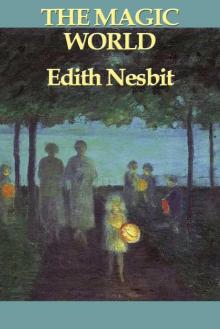 The Magic World
The Magic World In the Dark
In the Dark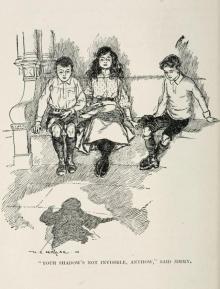 The Enchanted Castle
The Enchanted Castle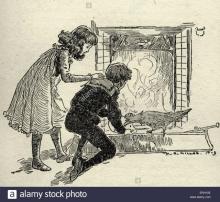 The Phoenix and the Carpet
The Phoenix and the Carpet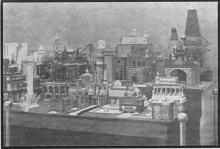 The Magic City
The Magic City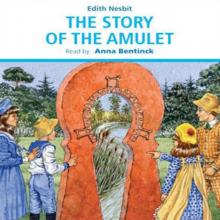 The Story of the Amulet
The Story of the Amulet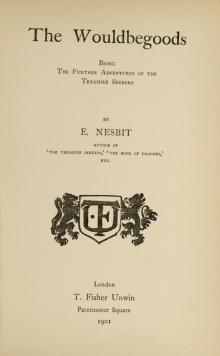 The Wouldbegoods: Being the Further Adventures of the Treasure Seekers
The Wouldbegoods: Being the Further Adventures of the Treasure Seekers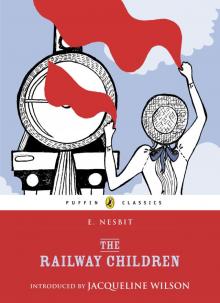 The Railway Children
The Railway Children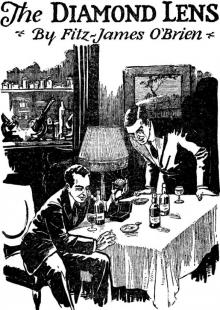 The Diamond Lens
The Diamond Lens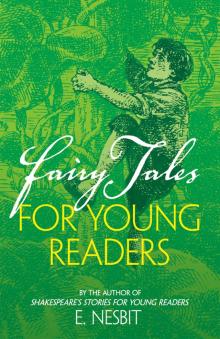 Fairy Tales for Young Readers
Fairy Tales for Young Readers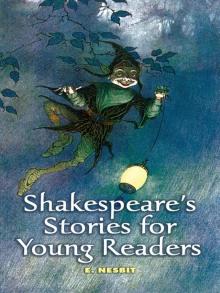 Shakespeare's Stories for Young Readers (Dover Children's Classics)
Shakespeare's Stories for Young Readers (Dover Children's Classics)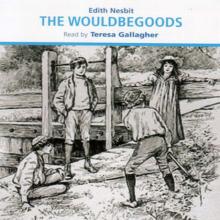 The Wouldbegoods
The Wouldbegoods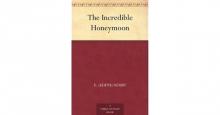 The Incredible Honeymoon
The Incredible Honeymoon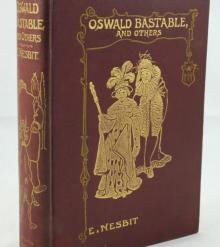 Oswald Bastable and Others
Oswald Bastable and Others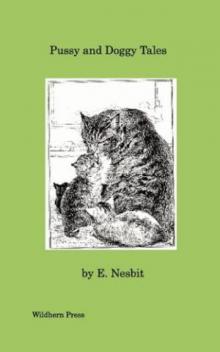 Pussy and Doggy Tales
Pussy and Doggy Tales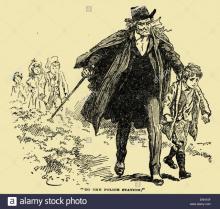 New Treasure Seekers; Or, The Bastable Children in Search of a Fortune
New Treasure Seekers; Or, The Bastable Children in Search of a Fortune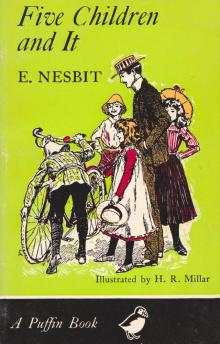 Five Children and It
Five Children and It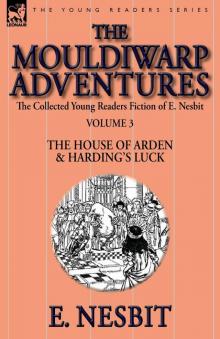 Harding's luck
Harding's luck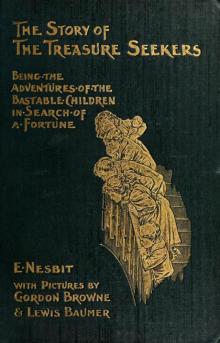 The Story of the Treasure Seekers
The Story of the Treasure Seekers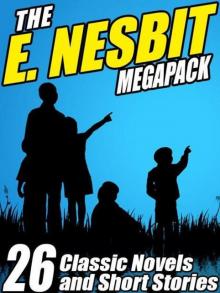 The E. Nesbit Megapack: 26 Classic Novels and Stories
The E. Nesbit Megapack: 26 Classic Novels and Stories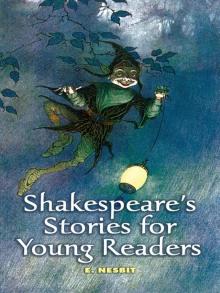 Shakespeare's Stories for Young Readers
Shakespeare's Stories for Young Readers